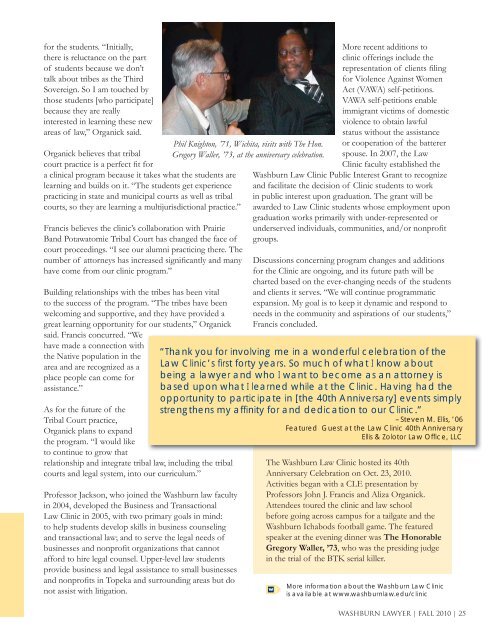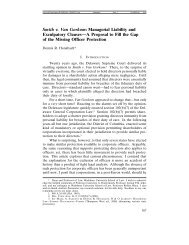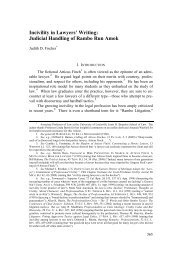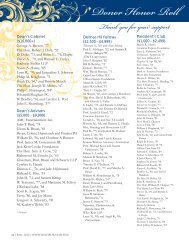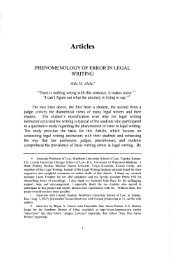Washburn Lawyer, v. 48, no. 1 - Washburn University School of Law
Washburn Lawyer, v. 48, no. 1 - Washburn University School of Law
Washburn Lawyer, v. 48, no. 1 - Washburn University School of Law
Create successful ePaper yourself
Turn your PDF publications into a flip-book with our unique Google optimized e-Paper software.
for the students. “Initially,<br />
there is reluctance on the part<br />
<strong>of</strong> students because we don’t<br />
talk about tribes as the Third<br />
Sovereign. So I am touched by<br />
those students [who participate]<br />
because they are really<br />
interested in learning these new<br />
areas <strong>of</strong> law,” Organick said.<br />
Organick believes that tribal<br />
court practice is a perfect fi t for<br />
a clinical program because it takes what the students are<br />
learning and builds on it. “The students get experience<br />
practicing in state and municipal courts as well as tribal<br />
courts, so they are learning a multijurisdictional practice.”<br />
Francis believes the clinic’s collaboration with Prairie<br />
Band Potawatomie Tribal Court has changed the face <strong>of</strong><br />
court proceedings. “I see our alumni practicing there. The<br />
number <strong>of</strong> attorneys has increased signifi cantly and many<br />
have come from our clinic program.”<br />
Building relationships with the tribes has been vital<br />
to the success <strong>of</strong> the program. “The tribes have been<br />
welcoming and supportive, and they have provided a<br />
great learning opportunity for our students,” Organick<br />
said. Francis concurred. “We<br />
have made a connection with<br />
the Native population in the<br />
area and are recognized as a<br />
place people can come for<br />
assistance.”<br />
As for the future <strong>of</strong> the<br />
Tribal Court practice,<br />
Organick plans to expand<br />
the program. “I would like<br />
to continue to grow that<br />
relationship and integrate tribal law, including the tribal<br />
courts and legal system, into our curriculum.”<br />
Pr<strong>of</strong>essor Jackson, who joined the <strong>Washburn</strong> law faculty<br />
in 2004, developed the Business and Transactional<br />
<strong>Law</strong> Clinic in 2005, with two primary goals in mind:<br />
to help students develop skills in business counseling<br />
and transactional law; and to serve the legal needs <strong>of</strong><br />
businesses and <strong>no</strong>npr<strong>of</strong>i t organizations that can<strong>no</strong>t<br />
afford to hire legal counsel. Upper-level law students<br />
provide business and legal assistance to small businesses<br />
and <strong>no</strong>npr<strong>of</strong>i ts in Topeka and surrounding areas but do<br />
<strong>no</strong>t assist with litigation.<br />
Phil Knighton, ’71, Wichita, visits with The Hon.<br />
Gregory Waller, ’73, at the anniversary celebration.<br />
More recent additions to<br />
clinic <strong>of</strong>ferings include the<br />
representation <strong>of</strong> clients fi ling<br />
for Violence Against Women<br />
Act (VAWA) self-petitions.<br />
VAWA self-petitions enable<br />
immigrant victims <strong>of</strong> domestic<br />
violence to obtain lawful<br />
status without the assistance<br />
or cooperation <strong>of</strong> the batterer<br />
spouse. In 2007, the <strong>Law</strong><br />
Clinic faculty established the<br />
<strong>Washburn</strong> <strong>Law</strong> Clinic Public Interest Grant to recognize<br />
and facilitate the decision <strong>of</strong> Clinic students to work<br />
in public interest upon graduation. The grant will be<br />
awarded to <strong>Law</strong> Clinic students whose employment upon<br />
graduation works primarily with under-represented or<br />
underserved individuals, communities, and/or <strong>no</strong>npr<strong>of</strong>i t<br />
groups.<br />
Discussions concerning program changes and additions<br />
for the Clinic are ongoing, and its future path will be<br />
charted based on the ever-changing needs <strong>of</strong> the students<br />
and clients it serves. “We will continue programmatic<br />
expansion. My goal is to keep it dynamic and respond to<br />
needs in the community and aspirations <strong>of</strong> our students,”<br />
Francis concluded.<br />
“Thank you for involving me in a wonderful celebration <strong>of</strong> the<br />
<strong>Law</strong> Clinic’s fi rst forty years. So much <strong>of</strong> what I k<strong>no</strong>w about<br />
being a lawyer and who I want to become as an attorney is<br />
based upon what I learned while at the Clinic. Having had the<br />
opportunity to participate in [the 40th Anniversary] events simply<br />
strengthens my affi nity for and dedication to our Clinic.”<br />
– Steven M. Ellis, ’06<br />
Featured Guest at the <strong>Law</strong> Clinic 40th Anniversary<br />
Ellis & Zolotor <strong>Law</strong> Offi ce, LLC<br />
The <strong>Washburn</strong> <strong>Law</strong> Clinic hosted its 40th<br />
Anniversary Celebration on Oct. 23, 2010.<br />
Activities began with a CLE presentation by<br />
Pr<strong>of</strong>essors John J. Francis and Aliza Organick.<br />
Attendees toured the clinic and law school<br />
before going across campus for a tailgate and the<br />
<strong>Washburn</strong> Ichabods football game. The featured<br />
speaker at the evening dinner was The Ho<strong>no</strong>rable<br />
Gregory Waller, ’73, who was the presiding judge<br />
in the trial <strong>of</strong> the BTK serial killer.<br />
More information about the <strong>Washburn</strong> <strong>Law</strong> Clinic<br />
is available at www.washburnlaw.edu/clinic<br />
WASHBURN LAWYER | FALL 2010 | 25


